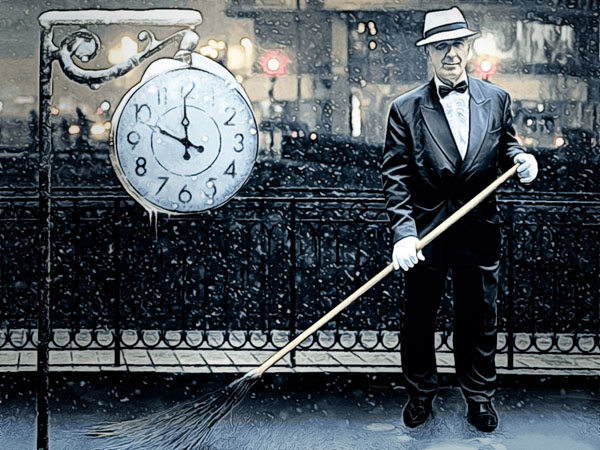
Standing on the parking lot of the little strip mall, Trevor Baker leaned on his push broom and waxed philosophical. He glanced at the clock tower across the street: 12 minutes until Jan. 1st, 1996, the dawn of a new year and for him, he knew, it would outpace every year that had come before. The wind began to pick up and tiny spicules of ice struck his exposed face. Trevor only smiled.
. . . . .
Trevor, enrolled in undergraduate school, raked leaves as part of his college work study employment. Money was scarce and he took his job, slight as it was, quite seriously. Occasionally he hunched his shoulders or made faces, almost unconsciously, and passing students glanced curiously at him. All at once a shadow fell across Tremor and he started.
“You got I.D.?” asked a campus policeman who was perhaps a decade older than Trevor’s 20 years. Tremor made no reply. He had found it auspicious to say as little as possible to the police. “C’mon,” urged the policeman impatiently. Trevor dug through his blue jeans and pulled out a wallet and turned up a driver’s license. “Are you on drugs? Are you loaded? Do you drive?” asked the cop rapidly. “Can you talk?” he asked. “Are you retarded, er, special needs?”
“I can talk,” Trevor assured him. “And I have a doctor’s statement saying I can drive,” he added.
“I’ll be the one to decide if you can drive,” snapped the policeman proprietarily. Trevor only shrugged.
The cop looked at him narrowly and then insisted upon a field sobriety test: follow my finger, watch my eyes, walk a straight line, touch your nose with your own finger, and so on. Other students and teachers observed Trevor and the cop curiously and Trevor was humiliated, although this was not the first time this had happened to him. Finally, more or less satisfied, the cop allowed him to return to work, with a curt warning: “Watch it. I’m keeping my eye on you!”
. . . . .
Trevor, fresh out of graduate school, crossed the hot asphalt parking lot, littered with snuffed cigarette butts, soda cans that had been run over by automobiles, crumpled pieces of paper and other urban detritus. As he approached the red brick building, he beheld a glass and metal door, with the words, Department of Public Aid emblazoned upon the glass. He pushed through and was nearly overwhelmed by the stench of urine, dirty diapers, marijuana and cheap cologne; this was 1989, when Hai Karate was still a best-seller. A small forest of cheap, pastel-colored plastic chairs rose up from the floor. In one corner sat a corpulent rent-a-cop reading a comic book and straight ahead was the service counter, with a large plexiglass screen separating the clients from the DPA staff. There was a line of people that extended nearly the length of the room. Making a beeline for the guard, Trevor asked him how one went about applying for Food Stamps. Trevor coughed and then twitched several times.
Without taking his eyes off his comic book, the fat guard growled, “I hears ya, fella,” and he pointed a finger at the ever-growing queue. Trevor took his place in line. The screams of babies and infants filled the air and Trevor could have sworn at least one person lit a joint. After about two hours of shuffling forward, he reached the front desk clerk, who handed him a questionnaire, a pen, and a slip of cardboard with a number on it. At length, his assigned caseworker appeared from the nether regions of the building and mutely led Trevor to an interviewing cubicle. The worker was quite handsome, some years older than Trevor’s 23 years, and he smelled nice. He wore a wrinkle-free dress shirt, chinos and a distinctive necktie. Everything about the young man screamed State Bureaucrat. He introduced Himself as Mr. Sweetin and reviewed the details of his new client’s identity as had been revealed to the front desk worker. He then proceeded to ask Trevor a battery of questions: Age? Any bastard children? Work history? And so on. When Trevor confessed that he had a job, the worker’s whole attitude changed; he seemed to think they were both wasting their time.
He told Trevor: “With no dependents, if you have any kind of decent job at all, there is virtually no chance you’ll qualify for Food Stamps.” The program was for poor people. What was Trevor trying to prove, anyway? All at once the caseworker wasn’t as good-looking as he had been only minutes before. While there were still no wrinkles in his shirt, there were sweat stains in his armpits. He didn’t smell as nice, either. And his tie was a clip-on. At length he stood, thereby dismissing Trevor. He told him good luck, and did he want to register to vote? Trevor didn’t. Before he departed, he asked if there were any employment opportunities with the DPA. The worker said there were many opportunities, for “the right person.”
“What does the position pay?” he asked. The caseworker told him. Trevor silently whistled. It was approximately three times what he earned at his first post-graduate job mopping floors.
Trevor asked Sweetin what qualified a person for a job such as his? Sweetin’s chest swelled importantly and he told Trevor that he’d need at least an associate’s degree, as Sweetin himself possessed, “to make the grade”. Trevor thanked him and slipped out of the cubicle.
Crossing the lobby. he pushed back through the glass and metal door and arrived again at the torrid parking lot, with the cigarette butts and the crushed cans and a dead bird or two, his welfare adventure now complete. Shit, thought Trevor, I could do this. It was but a matter of a state employment qualifying exam, and one month later, Trevor was hired.
. . . . .
Trevor Baker and his current significant other, Sally, sat slumped at a table in the back of the tavern, taking in the entertainment; this was Sunday and Open-mike Night. On stage, a faceless guitarist played Van Morrison tunes, much to the appreciation of the heavily-imbibing crowd. Sally sat close, her bare shoulders aglow in the warm yellow lights of the tavern. Although marijuana was not yet legal in this state in 1994, a thin haze of pot smoke rose languorously toward the ceiling. Which reminded Sally: “Bake, do you wanna get high?” With Sally, this could mean anything from beer to pot, from cocaine to Quaalude, so Trevor raised an inquiring brow.
“I bought some Mexican this afternoon,” she told him, turning up a small plastic bag and shaking it evocatively. Customers sitting at adjoining tables gazed enviously at Sally.
Trevor took a sip of beer and considered. With pot, it only served to make him horny; with Sally, it put her to sleep; altogether, he thought, it was a wash. “Sure,” he agreed, coming to his feet. As Trevor and Sally threaded their way though the crowded bar, Sally following in his wake, Trevor scrunched up his neck, first to one side and then the other, then coughed loudly and shot his arm out from his body for just an instant. Most bar patrons, used to this display, paid Trevor no mind; others, unaccustomed to the behavior, stared curiously. Sally rolled her eyes a little and looked down, but said nothing.
After they had made love, Trevor went through his twitching routine anew and Sally said, “Bake. I’ve told you this before: I think you have Tourette’s Syndrome. Talk to your doctor, babe.” Sally was a registered nurse and knew whereof she spoke.
“I did,” he said. “He said Tourette’s isn’t real and even if it is, there’s nothing you can do about it.” They’d had this conversation before.
“At the state hospital, where I used to work, they gave the patients Orap or Haldol,” she told him. “Ask him about those,” she urged. “Please, Bake, I hate to see you going through this without help.” She put her hands behind his neck and softly kissed him. He kissed her back. Sally, he thought, really got him.
“I’ll make an appointment tomorrow,” he promised, then screwed the lid off a container of cold medicine and decanted the syrupy green glop into a plastic cup.
. . . . .
The next morning, at the Public Aid Office, where Trevor worked as a caseworker, he sat at his desk, going through some pending files. Into the room walked Karen, a tall, slender coworker with whom Trevor had a newly contentious relationship. He’d overheard her say one time that “Trevor Baker is a pain in the ass. If he starts coughing and twitching again, I’m going to murder him.” Most of his coworkers were well used to his nettlesome behavior, but Karen seemed to take particular exception to it and found him a nuisance. As she made her way behind his desk, Trevor unleashed another hoarse cough. With a cry of exasperation, Karen, as she had done every day for a week, slammed a handful of cough drops onto Trevor’s desk. Sheepishly, he murmured his thanks. Without turning, she stalked on by.
Karen had found a key to retribution, however, quite by accident: inadvertently popping her ever-present chewing gum, she observed Trevor wince almost as if in pain. She repeated the action, garnered a like result. Trevor stared at her helplessly. Karen smiled tightly. This, she thought, was important information. Information she subsequently used again and again.
Trevor’s phone jangled. Seizing the receiver, he listened, thanked the caller and ventured to the lobby. There he found Vanessa, a 20-something client on which he’d done an overpayment the week before. “Good morning,” he said, leading the young woman to one of a rabbit warren of small cubicles branching off a narrow corridor. “How can I help you today?” he asked pleasantly. Trevor made a point of always being nice to his clients.
“I got a bill,” she said, proffering the statement for the overpayment he’d calculated. “I don’t understand,” she said, staring at him forlornly.
He took the statement, reviewed it and said, “It’s money you need to pay back.” He’d gotten a field evaluation by an investigator, who cited Vanessa for receving AFDC funds for which she was ineligible. He hadn’t questioned the contents of the report; he received them all the time.
“Is this about Reanne?” she asked, referencing her 8-year-old daughter, a beautiful dark-skinned girl whom Trevor had met several times. When he didn’t immediately reply, she went on. “Reanna die four weeks ago, Mr. Baker. She drown in the city pool.” Stunned, Trevor stared at her.
“I guess that’s it,” he answered at last. “You see, if she were…deceased, then you weren’t entitled to receive money for her.” Realizing the enormity of what he was telling this young mother, he hated both himself and the agency for which he worked. “I’m sorry, those are the rules,” he said lamely.
She nodded. Coming to her feet, she said, “I understand. Thank you, Mr. Baker,” and she was gone.
. . . . .
Trevor sat in his fancy new ergonomic computer chair, an early Christmas gift from his parents. The spare, sandy-haired man was seated comfortably in the open-space public assistance office, where, since his lateral transfer from the city, he worked as a caseworker, managing welfare cases. He had been so employed for almost a year. This chair, he thought sadly, as high-tech as it was, couldn’t prevent his hands from shaking. Sometimes, on a bad day, it was worse than others; just now, his hands quavered furiously. Clearly, this was not a good day.
Working in the new office had taken some getting used to. Gone was the malicious Karen and the others who referred to Trevor behind his back as a “head case.” But, unlike his previous fellow employees, his new co-workers steadfastly refused to call him Bake, opting to use his childhood appellation of Trevor. Into the room strode Bert, a colleague at the agency, just back from lunch, who observed his co-worker’s afflictions with the usual bemusement. He took off his winter coat, placed his Starbucks cup on his desk, which was next to Trevor’s, turned to the other man and said, “Hey, Tremor, what’s up?”
Trevor instantly became self-conscious and tried to hide his twitching fingers. Although his Tourette’s was 90% under control with the medication he took, other conditions, which had like symptoms, were getting worse. Bert’s coarse misuse of his name only added tension to an already tense situation. Trevor waited for the next remark.
Bert picked up his coffee, took a sip, smiled winsomely, but said nothing. The genius to his technique of torturing Trevor lay in levying the insults and putdowns only half the time. Always keep him wondering when the other shoe would drop, thought Bert smugly. To that end, Bert unwrapped a stick of gum and slowly placed it on his tongue, watching the other man from the corner of his eye. He chewed rapidly, soon getting the wad of gum limber. Then he began loudly popping it. He smiled with satisfaction as Trevor reacted severely to the chewing and to the sounds.
Trevor, who already suffered the early stages of Parkinson’s Disease, had only recently been diagnosed by his neurologist as also suffering from misophonia, a condition in which the patient exhibits untoward reactions to certain “trigger’ sounds, such as lip smacking, gum popping, dogs barking, clocks ticking, or people chewing with their mouths open. As a result of this condition, Trevor routinely frowned, sighed, or even stared at his nemesis. Which only encouraged Bert all the more. Also accompanying these reactions were increased heart rate, panic, anger, and a strong, almost desperate desire to escape the source of the trigger sounds. Just now, Trevor glared balefully at the other man. Bert smirked.
. . . . .
“What can I do about it, Dr. Patel?” Trevor had asked, when told of the diagnosis. “How do we treat it?”
The physician shrugged impassively. “There is no treatment,” he told him bluntly. “You can wear sound-deadening headphones or play music or,” he suggested, “ask your co-workers to stop their annoying behavior.”
Trevor had this condition, in varying degrees, since he was nine or ten years old—more than twenty years ago—though in those days there was no available diagnosis.
“Trev,” said his father, when the young man was eleven, “pretend that dog’s not there; that’s a boy!”
“Mom and Dad are going to take you to a shrink,” threatened Trevor’s brother, two years older and embarrassed by his sibling’s constant overreactions to ordinary sounds, not to mention his face-making and twitching.
The malady was still relatively unknown. Even today, Trevor’s own MD unapologetically admitted that he had never even heard of the condition.
Throughout school, Trevor had felt that he wore a cloak of misfortune that no one else seemed to understand. Bert knew none of this; he knew only that Trevor was “different” and “sensitive” and must therefore be punished.
“Want a piece of gum, Tremor?” asked Bert, cracking the Juicy Fruit between his molars. Trevor closed his eyes, gritted his teeth, and mentally placed himself somewhere far away. Snap! went Bert’s gum, and Trevor was figuratively seized roughly and wrenched back to the present, nearly sobbing with frustration. He felt a bead of perspiration trickle down his back. He had to do something!
He sprang suddenly to his feet and called out, “Ms. Shaefer, could I have a minute?”
Norma Schaefer, the office manager, also returning from lunch, frowned unhappily at her newest employee, but crooked a finger. What was it this time? She thought peevishly. “A quick minute,” she said. He followed her into her private office, dropped into a chair before her desk.
Once they were both seated, Trevor explained his recent diagnosis, described his symptoms, both physical and mental, and, in spite of his abject embarrassment, appealed to her for help. He had previously had to account to her for his tremor, which was due to Parkinson’s, because some of his welfare clients, as well as his co-workers, had questioned his sobriety and his sanity. Some had even conjectured that he was undergoing withdrawal from alcohol or drugs.
“What do you expect me to do about it?” she asked impatiently. “I mean, I’ve never heard of this condition, and besides, how can I tell employees they can’t chew gum?”
“It’s just the popping,” he stressed, “and chewing with their mouths open; it’s not gum chewing itself. It’s the noise.”
Norma’s mouth formed a straight, unhappy line. “Look, Trevor, the state already stopped employees from smoking. Many of them substitute gum for cigarettes, and I think that’s a good thing.” At his dispirited look, she pounced: “Maybe casework isn’t the right job for you…” He looked up sharply. “You just don’t seem very happy here,” she added, with feigned concern. You have little to say to anyone; you’re not even signed up for the Secret Santa gift exchange this Christmas.”
Trevor cast his mind back to the office Thanksgiving party, which had been held only the week before. Sitting by himself in the break room, he had witnessed Norma herself eating noisily at the next table.
She sounds like a garbage disposal, he thought wearily, looking dismally at the otherwise elegant woman. “What are you staring at?” she demanded, dropping a Buffalo wing back onto her plate with a little click. “Don’t stare at me!” Her loud chewing hadn’t seemed to bother anyone else, he’d noticed.
Trevor blew out a tired breath. Norma spoke again, drawing him back to the present: “Your work is adequate,” she conceded, “but if you can’t get along with the other employees and you aren’t happy here, then maybe you should consider a change.” And she left it at that, stealing an overt glance at her watch. Pushing himself to his feet, Trevor exited the manager’s office, his shoulders slumping in defeat.
Thirty days later, just in time for the new year, found Trevor, Master’s degree and all, sweeping the breezeway that bisected the strip mall where he now worked alone as a maintenance worker and groundskeeper. The air was cold, the wind brisk, but he didn’t mind. The salary was scarcely adequate, but at long last he had found what he most coveted: peace and quiet. He sighed, smiled a little and wondered with genuine interest what Sally was doing. Peace, he thought luxuriously. It was so sweet.











